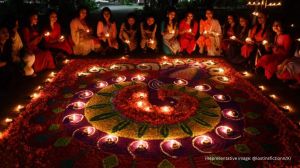Atri Mitra is a Special Correspondent of The Indian Express with more than 20 years of experience in reporting from West Bengal, Bihar and the North-East. He has been covering administration and political news for more than ten years and has a keen interest in political development in West Bengal. Atri holds a Master degree in Economics from Rabindrabharati University and Bachelor's degree from Calcutta University. He is also an alumnus of St. Xavier's, Kolkata and Ramakrishna Mission Asrama, Narendrapur. He started his career with leading vernacular daily the Anandabazar Patrika, and worked there for more than fifteen years. He worked as Bihar correspondent for more than three years for Anandabazar Patrika. He covered the 2009 Lok Sabha election and 2010 assembly elections. He also worked with News18-Bangla and covered the Bihar Lok Sabha election in 2019. ... Read More
Day ahead of Phase 2, Mamata writes to Opp leaders: unite against BJP
Banerjee's letter is being seen as an attempt to portray her as a rallying point for all parties opposed to the BJP which has mounted an aggressive campaign to dislodge her from power in West Bengal after a 10-year rule.
 Mamata Banerjee in Singur on Wednesday. (Express Photo)
Mamata Banerjee in Singur on Wednesday. (Express Photo)A day ahead of the second phase of elections in West Bengal, which will see Mamata Banerjee battling it out in the high-stakes Nandigram contest, the Chief Minister wrote to Opposition leaders, asking them to unite against the BJP’s “one-party authoritarian rule” and proposing that they chart a plan of action after the ongoing polls.
The three-page letter was addressed to more than a dozen non-BJP leaders, including Congress president Sonia Gandhi, NCP chief Sharad Pawar, Shiv Sena chief Uddhav Thackeray, Aam Aadmi Party convenor and Delhi CM Arvind Kejriwal, RJD leader Tejashwi Yadav, Samajwadi Party chief Akhilesh Yadav, DMK president M K Stalin, PDP chief Mehbooba Mufti and NC president Farooq Abdullah.
The letter got a cold response from the Congress, which is fighting the Bengal elections as part of the Left-led front — the party did not officially respond to the letter. The letter doesn’t address the CPI and the CPM either.
While many of the regional parties agreed with Banerjee, some raised questions about the timing of the letter.
 At Nandigram on Wednesday. A day ahead of the high-stakes Mamata Banerjee vs Suvendu Adhikari clash here, the Election Commission imposed prohibitory orders. (Express photo by Partha Paul)
At Nandigram on Wednesday. A day ahead of the high-stakes Mamata Banerjee vs Suvendu Adhikari clash here, the Election Commission imposed prohibitory orders. (Express photo by Partha Paul)
In her letter, Banerjee cited the example of the recently passed Government of National Capital Territory of Delhi (GNCTD) Bill to accuse the BJP and the Centre of “attacking democracy and constitutional federalism in India”.
“With this law, the Lieutenant Governor of Delhi has been made the undeclared Viceroy of Delhi, acting as a proxy for the home minister and the prime minister. The government has snatched away practically all the powers of the democratically elected government of Delhi,” she wrote.
“The BJP wants to make it impossible for non-BJP parties to exercise their constitutional rights and freedoms. It wants to dilute the powers of the state governments and downgrade them to mere municipalities. In short, it wants to establish a one-party authoritarian rule in India,” she wrote.
The West Bengal CM concluded by calling for a “united and effective struggle against the BJP”.
“…I shall work wholeheartedly with you and all other like-minded political parties in this battle. We can win this battle only with unity of hearts and minds, and by presenting a credible alternative to the people of India. After conclusion of the ongoing Assembly Elections, I suggest that we deliberate on these issues and chart a plan of action.”
Congress’s West Bengal unit chief Adhir Ranjan Chowdhury, who is also the leader of the party in Lok Sabha, laughed off Banerjee’s letter, saying, “I think she is in desperation to counter the BJP. But why so late? The fact is that in Bengal, the third front led by the Congress and Left have been marching forward to wrest power from the clutches of Banerjee. That is our single-point agenda.”
Many regional party leaders agreed with Banerjee but pointed out that “ego issues” between parties could come in the way of a united front.
“This letter is very pertinent in view of the sabotage we see of institutions and democratic norms. So once the elections are over… all political parties opposed to the BJP’s kind of politics must come together, jettison their personal egos…,” senior RJD leader and Rajya Sabha MP Manoj Kumar Jha told The Indian Express.
Senior Shiv Sena leader Sanjay Raut said, “Only after Bengal elections… everybody can come together and discuss. Pawar saab is there, Congress is there. Everybody should sit together…UPA should be strengthened.”
Asked about the Congress being part of such an effort, he said, “Definitely. Congress is the largest party, so should lead it. If ego issues come up, then there will be no unity.”
A senior non-Congress opposition leader, who did not want to be identified, said it is not easy bringing opposition parties together. “There are so many improbables. Will Akhilesh Yadav do business with the Congress? So many other parties won’t. If Congress says I want to lead…then it will never happen… the time of everybody accepting the unilateral leadership of the Congress is over.”
Another leader also wondered about the timing of the letter. “It seems she wanted to convey a message to the people that don’t vote for Congress and the Left or others. If you vote for anybody (else), BJP will win…That she is the only person who is taking on the BJP,” he said.
Senior DMK leader Tiruchi Siva said, “We have already been raising our voices on the same lines, in Parliament and outside.”
Expressing solidarity with Banerjee, PDP president Mehbooba Mufti tweeted, “Agree with @MamataOfficial di that in order to protect our democracy & its cherished values it is imperative for the opposition parties to unite.”



- 01
- 02
- 03
- 04
- 05





























